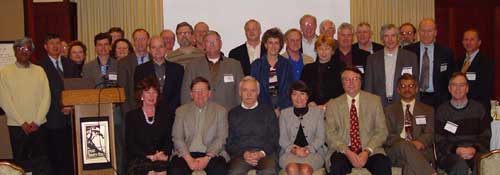UCSD Division holds NSF Workshop
 |
|
The NSF Workshop was held February 25-27, 2003. The event was co-sponsored by
Calit² and the UCSD Jacobs School of Engineering |
3.17.03 -- The National Science Foundation expects to accelerate research programs related to distributed cyberinfrastructure to support large-scale, shared facilities in a diverse array of scientific and engineering applications. In light of 9/11 and subsequent creation of the Cabinet-level Department for Homeland Security, NSF wanted to explore how the emerging cyberinfrastructure can help optimize response to unexpected events, both natural and of human causation.
In this context, UCSD applied to hold a workshop to draw out the opinions of experts in crisis management and homeland security to determine how the emerging cyberinfrastructure might be applied to this new applications area. The goal was to define a research agenda for NSF's distributed cyberinfrastructure initiative relevant to homeland security.
The workshop, held February 25-27, 2003, and co-sponsored by Calit² and the UCSD Jacobs School of Engineering, convened experts from computer science, engineering, and social and behavioral sciences along with those in crisis management and homeland security.
The workshop drew the participation of some 60 people with expertise in the following areas:
-
Crisis management at local, state, and national levels
-
Design and deployment of arrays and networks of sensors
-
Network design/architecture
-
Grid computing
-
Establishment and management of large, distributed data sources
-
Data mining
-
Systems analysis
-
Models for collaboration among scientists and engineers, and between technology researchers and end users (practitioners)
-
Network, systems, and information security
-
Ethical use of information
-
Management of technological enterprises
-
Advancement of national information infrastructure, such as the Internet
-
Management of government science and technology initiatives
-
National and international science and technology policy
Plenary sessions and panel discussion were held on a series of topics, followed by breakout working groups that reported back to the group as a whole at the end of the workshop. A wrap-up panel provided summary comments on the working group reports and the workshop as a whole.
Both panelists and working groups were asked to respond to the following questions:
-
What cannot be done today by the crisis management or responder community that you believe could be enabled by the right cyberinfrastructure?
-
What features can be expected of the cyberinfrastructure in the near future (3-5 years) that might provide new capabilities to the crisis management and responder community?
The final report from the workshop is expected to
-
Provide a list of research areas that, together, will improve the ability of the nation to respond to unexpected events.
-
Identify gaps between the research and crisis-response communities, and areas in which improved communications and collaboration between the two could lead to improved public safety.
-
Recommend the most effective means to design and develop new systems that include crisis management practitioners throughout the process.
-
Recommend development of collaborative centers to test new technologies under real life conditions with practicing emergency response personnel and dissemination of the lessons learned.
We are hopeful that the recommendations, under formal development at this writing, will lead to early prototyping "living laboratories" involving the participation of local, state, and federal "first-responder" agencies.
For more information on the workshop, who participated, and the presentations they made, see web.calit2.net/RiskReduction.

